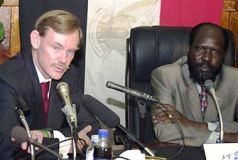US sends diplomats to Darfur for talks with SLM’s Minawi
Nov 11, 2005 (JUBA) — U.S. Deputy Secretary of State Robert Zoellick said Friday he dispatched two diplomats to speak with a faction leader of the main Darfur rebel group, whose internal disputes are hampering power-sharing talks with the government.
 Zoellick said the two U.S. diplomats would meet with Minni Minawi, a faction leader of the Sudan Liberation Movement, and press him to attend the next session of peace talks and not think that he can resolve the conflict militarily. The talks are set to resume Nov. 20 in Nigeria.
Zoellick said the two U.S. diplomats would meet with Minni Minawi, a faction leader of the Sudan Liberation Movement, and press him to attend the next session of peace talks and not think that he can resolve the conflict militarily. The talks are set to resume Nov. 20 in Nigeria.
Sudan Vice President Salva Kiir Mayardit told Zoellick he met Thursday in neighboring Kenya with leaders of the Sudan Liberation Movement. Kiir said he told the rebels that their internal power struggles were complicating power and wealth-sharing talks with the government.
Zoellick had delivered the same message earlier this week to Sudan Liberation Movement leaders. Zoellick also has expressed concern disputes among the rebels had contributed to deteriorating security in the western region of Darfur.
Kiir was leader of a southern rebel organization that disarmed after 21 years under a January agreement some see as a model for resolving the Darfur conflict. Kiir’s organization is believed to have influence over the Darfur rebels, though the conflicts weren’t related.
Also Friday, the U.S. moved to cement ties with the autonomous government of southern Sudan by opening a consulate in the south.
The consulate, the only one any country was operating in the southern capital of Juba, was to be housed for the time being in a Red Cross compound.
Zoellick is in Sudan to try to shore up the southern peace deal and strengthen peacemaking in Darfur and in eastern Sudan.
The January north-south peace agreement provided for a unity government of northerners, most of whom are Muslim and of Arab descent, and southerners, most of whom are Christian or animist and of African descent.
Kiir demonstrated independence from the unity government Friday, refusing, in response to questions, to reiterate calls northerners have repeatedly made for the U.S. to drop sanctions against Sudan. The sanctions stem from both the north-south war, Darfur and allegations Sudan harbored Islamic terrorists — among them al-Qaida chief Osama bin Laden in the 1990s.
Kiir said the sanctions would not stop the U.S. from aiding the south, and left it to Washington “to evaluate and assess whether the conditions that led to the imposition of the sanctions have changed or not.”
Zoellick also said the sanctions wouldn’t keep his government from aiding the south. He added lifting them would be difficult before peace came to Darfur.
The north-south peace agreement also provided for an autonomous south with its own army, government and a new constitution during a six-year interim period. After the transition, the 10 southern states will hold a referendum on independence.
Implementation of the deal faltered after the death of the southern leader John Garang in a helicopter crash in July. Among the key provisions whose implementation has been delayed were steps to ensure oil revenues are equitably shared.
Concerns the north-south peace could fray added to uncertainty and instability amid the conflict in Darfur, scene of one of the worst humanitarian crises in the world.
The U.N. estimates that 180,000 people have died, mainly through famine and disease in Darfur. No firm figures exist on the number killed in fighting. Several million more have either fled into neighboring Chad or been displaced inside Sudan.
(AP/ST)
